- Home
- Guillermo Del Toro
The Shape of Water Page 19
The Shape of Water Read online
Page 19
“You deserve better than this. You deserve people who value you. You deserve to go somewhere where you can be proud of who you are.”
The voice, Lainie realizes, feels sovereign from her because it’s not only speaking to Giles Gunderson—it’s speaking to Elaine Strickland. She deserves better; she deserves to be valued; she deserves to live in a place where pride is not an exotic gift. Once more, the young wife and doddery gent are one and the same, stamped as deficient by people who haven’t the higher ground to make the accusation. Klein & Saunders is a start but only that: a start.
He’s fussing with his bow tie, searching the corner of the room for clues, but she keeps nodding, harder and harder, urging him to do the right thing, to walk out of the room. He exhales with a weak shiver and stares down at his portfolio case. Then he inhales sharply and looks right at her, his eyes sharp with tears and his mustache quivering with a brave smile. He holds out the case. Not the painting—the whole case.
“For you, my dear.”
She can’t accept it. Of course she can’t. But Giles’s arm shakes the very same way her voice had shaken; he’s matching her impulsive heroism with that of his own, begging her to take the burdensome baggage of his life off his hands. Lainie takes the case, her fingers settling into grooves shaped by his fingers over the years into soft red leather. She sees the shifting of Giles’s shadow as he moves away, but she doesn’t look up. It would only make it harder for him, she senses, and besides, she’s looking for a place to set down the case so that it, heavy with significance, doesn’t crash through three floors of the building.
21
HOFFSTETLER IS CHECKING, for the final time, the barometers reporting temperature, volume, and pH from the F-1 pool, his assistants wheeling hand trucks of equipment from the lab for good, when he’s struck by a staggering fact. He might never again be this close to the Devonian, at least while it still breaths. On Monday, a sickening three days off, he himself will dissolve it from the inside via Mihalkov’s hypodermic solution.
Had it been the body armor of lab coats and battle shields of briefcases that had made him impervious for so long to others’ pain? Well, today he wears no coat; he threw it to his office floor, disgusted by its invisible soaking of blood. And his briefcase? In mere days it has come to represent the collapse of his meticulously maintained life; it is filled with crumpled notes, cracker bags, cookie crumbs. For once, no modicum of professionalism separates death and deliverer in F-1.
Hoffstetler’s victim—he won’t permit himself to think of the Devonian by any gentler term—floats at the pool’s center, the chains affixed to its harness as still as rods. Its sole show of life is the light spilling from its eyes like smelted gold across the water. Hoffstetler thinks of Elisa Esposito’s dancing and the Devonian’s delighted illuminations, and he’s gripped by a fierce jealousy. It isn’t fair that she got to love it, and it her, while he—he’s saddled with a murder no god will forgive. He replaces the barometers, tries to shake off all feelings of tenderness. Those won’t make it any easier to jam the killing needle through bony plates.
He has no reason to believe the Devonian feels anything toward him but hatred. None at all. And yet, as he hears the lab doors close behind his assistants, he finds himself raising his eyes imploringly. If Elisa did it, he could have done it as well: make contact, real contact, with the Devonian. He’s managed to live with himself despite repeated trespasses of the humane. Can he forgive himself for this final trespass as well?
The lab is empty and still. Hoffstetler sets down his notebook, not caring if it gets wet, if all his carefully notated facts go blurry, for what good have facts done him at Occam? He crosses the red warning line and lowers himself to the pool’s ledge, dampness soaking through his seat. His hands are used to being empty; they fumble for each other while his spine slumps. It is a melancholic pose, like hunching at the graveside of a loved one. Another fantasy of humanity. He has no loved ones. Not in this land. Even the Devonian, a being of another world, has him beat in that regard.
“Prosti menya, pozhaluysta,” he whispers. “I am so sorry.”
The gold-hued water undulates as softly as a field of wheat.
“You cannot understand me. I know this. I am used to it. My real voice, my beautiful Russian—no one here can understand it. In that way are we similar? Perhaps if I speak with enough feeling you will understand?” Hoffstetler taps his own chest. “I am the one who failed you. Who could not save you. Despite the diplomas I have packed away in boxes. Despite the honorifics they attach to my name. All of this to parade me about as intelligent. But what is intelligence? Is intelligence calculations and computations? Or must true intelligence contain a moral component? Each passing minute, I believe more that this is the case. And therefore believe that I am stupid, stupid, stupid. These chains, this tank—this is your repayment for saving my life. Do you know that you did? Can you smell it in my blood? I had the razor blades all picked out. And then they found you, as if from the pages of the Afanasyev fairy tales I read as a boy. Stories of magical beasts, strange monsters. It is you, my dear Devonian, who I have waited to meet my whole life. Our relationship—it should have been wondrous. I know my world is dry and cold. Yet there is so much in it that I could have shown you, that might have brought you joy. Instead, you and I have no relationship at all, do we? You do not even know my name.”
Hoffstetler smiles into the vague shape of his dark reflection.
“My name is Dmitri. And I am so very, very pleased to meet you.”
Sobs break out of him. Hot tears blast down his cheeks, a dozen at once, like he’s the one injected with Mihalkov’s serum, he’s the one whose guts are melting. He braces himself against the ledge and watches the tears patter into the pool, a diminutive rainstorm, the first Baltimore has seen in months.
The water is cut in half. It is the Devonian’s hand, slicing upward like a shark, its claws like five pearlescent fins. Hoffstetler recoils, totters from the ledge. But there is nothing to fear. The Devonian is three feet away, having swum close without a sound, and is already retracting its arm. Hoffstetler watches with held breath as the creature passes its fingers through its mouth, over its tongue. There is no question what is happening.
The Devonian is tasting his tears.
Hoffstetler knows that he is fortunate that none of his team enters F-1 at that moment. His mouth is open in a silent bawl, his face is slick and flushed, his whole body is shuddering. The Devonian’s double jaws gnash over his salty tears, and its eyes soften from metallic gold to sky blue. The Devonian lifts himself upright in the pool, seeming to defy gravity, and bows to Hoffstetler. There is no other word for it. Then it quietly dives under, its webbed feet giving a final wiggle that, to Hoffstetler reads like a thank-you as well as a good-bye.
22
DRIVING IT OFF the lot is a dream. The de Ville’s tires don’t touch the pavement. They roll on cottony clouds. On the whorls of his cigarette smoke. On the bouncy curls of the girls giving him, and his car, lusty looks at every stoplight. All he’d have to do is open the door and they’d pile inside. Happily, willingly, and knowing their place: the backseat. The American Dream—he’d thought it was lost. Misplaced in the boxes from the move. But wouldn’t you know it? Those clever boys in Detroit had managed to build it out of steel. All you had to do, mister, was pony up the cash, and it was yours.
Plenty of choicer parking spots exist at Occam, but Strickland picks the one on the end. Everyone who parks will see the Caddy. Even the buses ferrying service staff will have to pass it. He gets out, squats beside the teal beauty, inspects it. A blemish of dirt near the wheels. Some grit on the front fender. He takes a handkerchief and buffers the spots until they gleam. He feels better than he did this morning. Lainie’s got a secret, and that’s unacceptable. But the car helps. The car is a partial solution. He pulls out the bottle of pills and knocks a few into his mouth. There’s another solution, an even better one, inside Occam.
His mood is
optimistic enough that he doesn’t bark at the janitors smoking on the loading dock instead of the upper lobby. They toss their butts and scatter. Strickland manages a grin. So what? Let the rank and file blow off a little steam. He even picks up the broom they left lying there and props it against the wall. He enters Occam via his key card and ambles down a bustling hall. Scientists, administrators, assistants, cleaners. Is everyone looking at him? He’s pretty sure they are. And why not? He feels like the de Ville. Huge and shining. Gobbling up the road and everything on it.
The second solution is Elisa. She doesn’t get in until midnight. Strickland keeps himself good and medicated until then. He’ll cut back on the pills, he will. Just not today. Every task he selects is spiked with anticipation. He dusts the security monitors with the same gentle motions he used on the Caddy. He tracks down a puffy-eyed Hoffstetler just so he can boast about the coming vivisection. He finds a cardboard box and gets a head start on collecting personal items from his desk. He pictures Occam, and Baltimore, diminishing in the Caddy’s rearview mirror. Washington, too. Is that Elisa in the seat beside him? If Lainie’s going behind his back, why can’t he do the same? He and Elisa will drive until General Hoyt can never find him.
Twelve fifteen, he taps the intercom.
“Could you find Miss Elisa Esposito and send her on over to Mr. Strickland’s office? I made me a little spill.”
A spill. He supposes he should make one. He looks about, sees the bag of hard candy. He doesn’t need all that candy. Not until he gets off the pills anyway. He gives the bag a flap. Watches the balls race into dark corners like green mice. It’s a little vigorous; they roll pretty far. What if she doesn’t buy it? He laughs once and feels his stomach flip. He’s nervous. He hasn’t felt nervous about a woman in a while.
A single knock at the door. He puts on a big grin and looks up. There she is, prompt as a schoolgirl and decked out in janitorial grays. Mop held like a bō staff and chin tilted down in the classic posture of mistrust. He can feel cool air on his back molars. Is his grin too wolfish? He tries to shrink it. It’s like relaxing a stretched rubber band. It still might fire off, shoot across the room if he’s not careful. He’s not used to handling grins.
“Hello, there, Miss Esposito. How are you tonight?”
The girl is as taut as a cat. After a moment, she touches her chest, then fins her hand outward. Strickland sits back in his chair. A scintillating rush passes through his head. It’s hope. He’s forgotten how it feels. He’s made so many mistakes. Getting involved with Hoyt. Letting Lainie stray, possibly out of reach. Right now, though, right here under the monitors’ soft, dim light, there’s a chance. Elisa is everything he needs. Quiet. Controllable.
Elisa extends her neck into the room and looks about. This dings Strickland’s serenity. She looks as if expecting a trap. Why would she think that? He went out of his way to wrap new bandages over his unsightly fingers and to stow the Howdy-do out of sight under the desk. He gestures at the floor.
“No need for the mop. I only spilled some candy. Rolled right out of the bag. Don’t want it to attract bugs. Pretty easy little job. Guess I could’ve done it myself. Except I got a bunch of stuff to do. That’s why I’m here so late. Paperwork.”
There is no paper on his desk. He should have thought of that. While Elisa consults her cart, he extracts a random file from his desk. Elisa enters the room with dustpan and brush held like nunchucks. She’s as observant as a cat, too. Her eyes are on the file he’s suddenly holding. He doesn’t like that, feels caught in a lie. But he does like her looking at him. She kneels in a corner to brush up a candy. Looks good doing it, too. Strickland feels a surge of power. Same as he did from the vibrations of the Caddy’s V-8. Power windows. Power brakes. Power steering. Just plain power.
“I’m not real used to these late hours, I guess. Get tired and clumsy. I guess you’re used to it, though, huh? It’s morning for you. You’re probably full of energy. Hey, you want some candy? Not from the floor, I mean. I still got some here in the bag.”
She’s in front of the desk now, crouched between the chairs. She looks up, holds his eyes for a few seconds. The gray monitor light flatters her. Her hair is storm clouds. Her face a lambent silver. The scars on her neck two glowing lines of nightsurf. He loves those scars. He wonders if there are other places on a woman’s body where scars might look as pretty. Lots of them, probably. Elisa shakes her head. No candy, no thank you. She starts to look away, but Strickland doesn’t want to lose sight of those scars.
“Hey, hold on. I’ve got a question.” On cue, one comes to him. “When you say you’re mute—well, I guess you didn’t say it. The Negro woman said it. You can’t say anything.” He laughs. She doesn’t. Why not? It’s a harmless joke. “Anyway, I’ve been wondering. Is it a hundred percent? I mean, if you get hurt, do you make a noise? Not that I’m planning on hurting you.” He laughs. Again, no reaction. Why won’t she relax? “Some mutes, you know, they squawk a little. I was just wondering.”
The words don’t come out perfect. He’s not given to pleasantries. He’s no Dr. Bob Hoffstetler, rattling off all the reasons he’s so damn brilliant. Still, the question deserves a nod, a gesture, something. Instead, Elisa turns away, gets back to her task. From the sound of it, as quickly as possible. Strickland takes a second to think. If anyone else ignored him, they’d regret it. This janitor, though, it only augments her blissful silence. He’s left staring at her backside. Tough to get a sense of it under that uniform, but he figures it’s good enough. Definitely good enough if she keeps wearing shoes like that. The shoes are leopard patterned. Leopard patterned. If she’s not wearing them for his enjoyment, then whose?
Each candy cracks when it hits the dustpan. Like twigs cracking in the jungle, the approach of a predator. Strickland stands up, paces before the monitors to shake it off. Right away, Elisa rises to her feet. She’s either done or done trying, and bolts for the door, but can’t move very fast. Candy rolls all over the dustpan, a balancing act fit for a circus. Strickland blocks the door with his right arm. Elisa pulls up short, the green candies clacking like bronchitic lungs.
“I know how it sounds,” he says. “Me, who I am. You being you. But we’re not that different. I mean—who do you have? Your file says you don’t have nobody. And me, I guess it’s not the same for me, but it feels—what I’m trying to say is that I feel the way you do. I figure we both got things in our lives we’d change if we could. You know?”
Strickland can’t believe it, but there it is. He’s raising his left hand, touching one of the neck scars. Elisa’s whole body stiffens. She swallows hard. A birdie pulse palpitates her jugular. He wishes he could feel its throb, but his fingers are bloated, bandaged, one of them pinched numb by a wedding ring. The ring Elisa presented to him right here in this office. He switches hands, traces a neck scar with his index finger, half-closes his eyes, gives into his senses. The scar is soft as silk. She smells so clean, like bleach. Her frightened breath purrs like the Caddy.
In the Amazon, his party found the cadaver of a marsh deer, its antlers tangled in the ribs of a jaguar. The índios bravos had supposed that the two beasts had been locked together for weeks prior to dying, a grotesque crossbreed. That’s him and Elisa, Strickland thinks. Two opposites, trapped together. Either they find a way to work together to break free, or both of them wither to bones. Female brains, he knows, require time to think. He lets his arm slide down the door frame. Elisa doesn’t wait. She plunges outside, unloads the dustpan into the trash, grabs and wheels her cart. She’s leaving, she’s leaving.
“Hey,” he calls.
Elisa pauses. In the brighter lights of the hall, her cheeks are pink, the scars red. Strickland feels a swirl of panic, loss, and frustration. He forces a smile, tries to mean it.
“I don’t mind you can’t talk. That’s what I want to say. I even kind of like it.” A good-natured entendre pops into his mind. Is it a permissible one? Will she respond positively to it? His head is dizzy fro
m pills, and he doesn’t dare miss the opportunity. His rubber-band grin stretches again, close to snapping. “I bet I could make you squawk. Just a little?”
23
ZELDA SEES ELISA leaving Mr. Strickland’s office. There’s a bunch of possible valid reasons. Maybe Strickland, with his bulky bandaged hand, made some kind of mess. Or Elisa’s QCC had a note from Fleming about cleaning the normally restricted room. But when in their Occam history have either Zelda or Elisa fielded a special directive from Fleming without sharing it to speculate on its meaning? Elisa has said nothing. These days, does she ever? Zelda tells Elisa a Brewster story, Elisa asks no questions. Zelda tries to ask what’s wrong, Elisa pretends not to hear. Each snub is a poke to Zelda’s ribs as hard as if from Strickland’s cattle prod. She’s building up bruises. She winces over them even at home. Brewster has noticed, and when Brewster notices, you know your signals are firing like flares.
“It’s Elisa,” she’d admitted.
“Your friend at work?”
“She’s just been treating me … Oh, I don’t know.”
“Like the help?” Brewster snapped.
That’s Brewster. You catch him anywhere but in front of the TV, he’s switchblade sharp. Too sharp for Zelda; you don’t nourish a friendship this long and let it go, a petal in the wind. Some outside force is in play, and it has to be F-1. Since the time Strickland nearly caught Elisa inside, Zelda has twice spotted Elisa pushing her cart from the direction of F-1. Zelda gives Elisa every chance to share details, from the open-ended Did you see anything interesting tonight? to the pointed I sure wonder what’s going on in F-1. Elisa divulges nothing. Not even a shrug. More than out of character, it’s rude, and Zelda’s beginning to wonder if she should follow Brewster’s advice, respect herself, and turn her back.
Is Elisa’s friendship really so much to lose? Zelda figures she could integrate herself into the other graveyarders, no problem. A couple more cigarettes smoked on the loading dock, a chuckle shared at Elisa’s expense, and wham—she’d be current with all the inside jokes. It would hurt, but work was work, and Occam, she reminds herself, is but one limb of her life. She has family. Aunts and uncles and their various snarls of offspring, not to mention Brewster’s busted family tree of half-cousins, third cousins, and fringe clingers she’d never quite placed. She has neighbors, too, some of whom she’s known for fifteen years, some who hurrah when she arrives at their cookouts. And there is church, which is family and neighbors both, where they get loud, where they embrace and cry, where there is always support, always love.

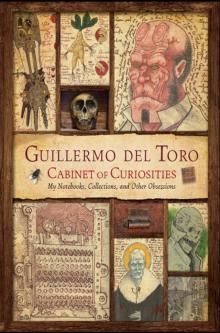 Cabinet of Curiosities
Cabinet of Curiosities The Complete Strain Trilogy
The Complete Strain Trilogy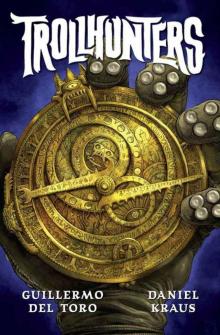 Trollhunters
Trollhunters The Night Eternal
The Night Eternal The Fall
The Fall The Shape of Water
The Shape of Water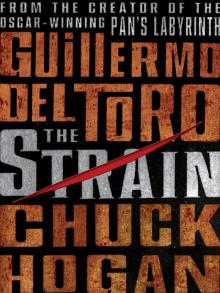 The Strain
The Strain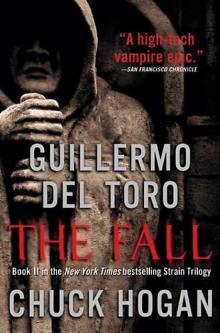 The Fall tst-2
The Fall tst-2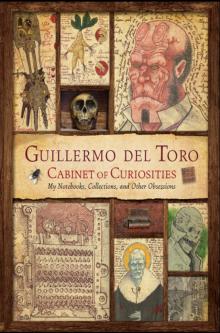 Guillermo del Toro's Cabinet of Curiosities
Guillermo del Toro's Cabinet of Curiosities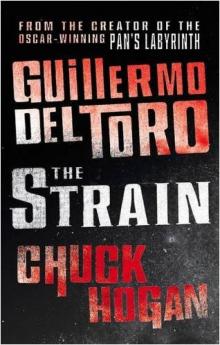 The Strain tst-1
The Strain tst-1 The Strain, the Fall, the Night Eternal
The Strain, the Fall, the Night Eternal